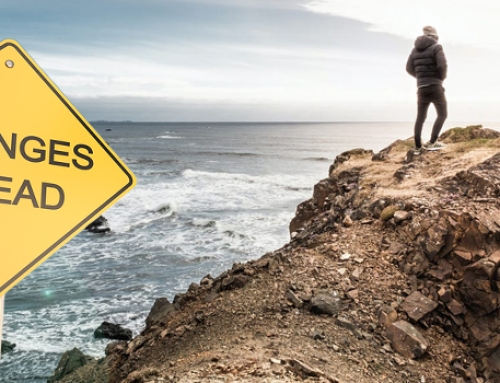It used to be that nearly everyone had some working knowledge of what it took to be self-sufficient. It was passed down in everyday living from parent to child. In fact, one could only be totally oblivious to the practices if they tried hard enough. The general public had some wherewithal when it came to working with less money and more opportunity to do well by yourself.
Odds are the last 40 years in the lap of luxury, generally speaking, the change of the priority of getting by with what you had to get all the amenities one could charge, rent, or borrow for has turned that self-sustaining know-how on its head. Parents in the last generation (post-WWII) did less and less of the Self-Reliant modeling with an emphasis on the more intellectual intangibles than the practical tangibles of what it meant to be an adult and take care of your own.
This gap has left my generation in the dark when it comes to the most basics of living. We have been raised to get that machine or contraption that could make X, Y, or Z easier to do. In fact, you really didn’t need it, it was just more of a status symbol instead of a necessity. The family traditions of a cohesive family unit were discouraged, disparaged, and dismantled. Family gardens became less and less as people moved more into cities and suburbia with smaller and smaller lots. Home remedies, mending your own clothes, canning for winter months, and more were shunned for Big Pharma synthetics, buying something new when things wore out, and highly processed foods. Children were encouraged to discard generational cultural and familial connections and not to be dissuaded in the forsaking of past traditions.
Although some of that was needed to release past prejudices, it also left a near-complete “blank slate” for many of us to wonder, if the social constructs in America were to break down, how could we cope with the absence of electricity, of food distribution, and maintenance to aging items?
Who is going to take care of the remaining 99% percent of the population when a major disruptive event occurs? My guess is that most folks believe that the government will step in. Yeah right. Just like they did with Katrina and Superstorm Sandy.
The truth is that the US Government is ill-equipped to take on a massive rescue operation. Plus, if the disruptive event is an economic collapse, you can bet that corporations will be bailed out long before the populace. It happened in 2008 and 2009, and many of us have the retirement account statements to prove it.
Five Major Types of Self-Sustaining Action Takers
More and more people are waking up to the fact that they are ill-equipped for the hardships that happened in the past. And as students of history already know that things of life are cyclical, they are seeing the need to learn anew what they must have to survive and thrive. From what I can ascertain, the mix of responders to what we do at ThatAquaponicsGuy falls into five major camps.
First, are those ones who know that they haven’t a clue what they could or will do when downturns happen in the future. All they know and plan on are going to those who have had the foresight in getting something put together. This unwise course of action not only makes them incredibly vulnerable to all the fears those times bring but also will put a heavy burden on all they impose upon. Our advice is to those thinking that this is what will suffice, we say get off your lazy arse and get the skills that will be worthwhile to keep you alive in times of extreme want!
The Second is the Sustaining Wannabe. This is someone who wants to embrace preparedness, make all the plans they can on paper but does not know where to start. Paralyzed into inaction all they can do is imagine how t would be. He or she may also feel they do not have adequate financial resources to prep.
The Third comes to the Self-Reliance Newbie. This state of action tier has started to prepare but needs help in sorting through an overwhelming amount of advice and preparedness strategies both online and off. Whether it is simple handholding or education, these Newbies have started their journey but continue to seek knowledge and positive reinforcement to ensure they are on the right path.
Fourthly comes those Dedicated to Self-Reliance; someone who has embraced the Boy Scout motto “Be Prepared” lifestyle with gusto. These adherents have supplies, knowledge, and skills but are seeking to fine-tune their preparation with advanced strategies for survival healthcare, living off-grid, and coping with civil unrest. They actively share their own personal experiences with others and offer tips to help other prepper-types learn and grow. I consider myself to be at this stage.
Fifth and lastly there is the Diehard. This level of prep is planning for a major apocalypse and devotes considerable time and energy to ensure that he or she will prevail. The Diehard may have a well-stocked bug-out retreat where they can live out their days if the end of the world should come. They likely will also be highly secretive and unwilling to share one-wit of what they have and what they know.
Being a Diehard has simultaneously gotten its knocks as well have been somewhat glamorized by the entertainment media. This serves to disillusion and discourages those who are unable or unwilling to create this type of alternative life for themselves.
No matter where you find yourself in any of these stages of preparing oneself to be self-sustaining. I do not mean to imply that any stage is a bad thing. Not at all. Rather, it is our duty to exercise our own free will to make preparedness decisions that bring sense to our unique situations. There is no such thing as the one-size-fits-all answer when it comes to Self-Reliance.
Okay, so we now know that there are at least five stages and types. It is good that we can see where we are on the spectrum of things. This brings me to the topic for today; 10 simple strategies for becoming prepared.
10 Simple Strategies for Growing Your Self-Sustaining Chops
1. Do your own research
Everyone comes to this realization from different point. You live in different geographical locations, have different financial considerations, and have different needs. In order to succeed as you would like to, you need to do what is right for you and not the guy down the street. Do your own research and come to decisions that are right for you and you alone. HOWEVER, do not let the research phase paralyze you from action, and moving forward. There is a point where you just need to get off the crapper and start getting things done.
2. Start small and be consistent in the actions you take
You can start this journey without major investments of money. And that is good news, because for most of us we do not have gobs of cash on hand to splurge on the latest new gadgets in the Prep World. We can begin with the smallest of moves, of getting the home staples among the other things that will come in handy on the go or when you hunker down.When a natural disaster of other disruptive event occurs, you want to act on instinct. You can only do that if you have been consistently practicing what you can do in that type of event.
3. Stockpile as much water as you can and learn how to purify the rest
Store as much water as you can. Remember to use containers, that are fully cleaned out from previous uses (2Liter bottles for example). Look for hidden locations in your home where you can store water you have bottled yourself using plastic soda or juice jugs, Water Bricks, water cooler containers or something else in a like vein. Beyond that, find other sources of water that you can use in an emergency and learn how to safely filter and purify raw water for drinking purposes.
4. Purchase home staples and learn how to cook from scratch with them
One of the things that our grandparents did was to make sure they kept a bevy of food staples at the house. Fore example, beans and rice are chock-full of calories and, in the case of beans, extremely nutritious. Stock up on dried beans and rice then learn how to cook them off grid, and outdoors over an open fire or rocket stove. But you can do this with types of wheat, or flour, of oils, lard, or crisco. Of sweeteners like sugar, honey or natural agave. And the list can go on and on, identify what you use regularly and get more of that each time you go to the store than the other snacks and knick-knacks.
For very little money and with very little skill, you will keep hungry bellies full when there is no other food to be had.
5. Work toward optimal physical fitness
Exercise regularly and stay in shape. Many forget about this, and when the time comes when you have to have some endurance for a good hike, they are found wanting. This does not mean that you have to be thin. Rather, build up your stamina and strength so that you can perform manual labor for extended periods.
Hike, power walk, lift weights, bicycle; pick something and stick with it so that you reduce body fat and build up muscle endurance and physical tolerance.
6. Develop a community and become involved with like-minded people
Regardless of where you live or your family situation, become a community with others. Even if your community consists of only two or three persons, these few people will serve as your support group and sounding board for the tactical decisions you will make when things get tough. In addition, you need at least one other person to watch your back as you will watch theirs.
7. Create and grow your survival library
No one can remember every single detail about every single subject. Only if that were true, that we could pull out of our memory in perfect time how to make a steam boiler, or change the pH balance in our gardens. As practiced and skilled as you may be, there will always be a situation where you either forgot or just plain do not know. Build up a survival library. And don’t just keep them in electronic form! There may come a time all you have access to are the hardcopies. Binders full of paper are good or even getting them into bound books is better. Just keep around what you think you’ll need and Google or YouTube are no longer around.
8. Put together the basics
Bugging in during a disruptive event is always preferable to bugging out. That being said, if your home is no longer safe, and if you are in the line of fire, you may be required to get out of Dodge. This does not mean that you will have to flee haphazardly to the woods. Bugging out may as simple as retreating to a friend or relative’s home or as complicated as hiking in a storm to the nearest shelter twenty miles a way. Regardless of where you bug out to, you are going to need some basics to help you get by.
A basic bug out bag that is light enough to carry when fully loaded, is something every member of the family should possess.
9. Practice an evacuation plan
Closely related to #8, if your home is no longer safe to live in for whatever reason, have a plan to leave already in place. Map out with those that you live with an evacuation route in advance. Determine two or three different ways to physically exit your home and then two or three ways to find your way out of the immediate area. At least one of the routes should avoid major streets and arterial locations.
Once you develop an evacuation plan, practice by traveling each route at least once annually.
10. Learn the basics of first aid and survival medicine
As mentioned above the Home Remedies that had been passed down from generation to generation are almost lost. Now there are some that are have more of a placebo effect, but there are a great many others that used properly can do just as well or even better than what you could get from Big Pharma. Learn about herbal medicine and keep a good book on survival medicine on hand as a reference. Acquire extra prescription medications as well as antibiotics and essential oils. Additionally, put together a comprehensive first aid kit that includes trauma supplies as well as protection gear to keep you safe in the sick room.
Overall TakeAway
Each of these steps to take has been listed with an all-too-brief explanation. The reality is you will need to take each into more than cursory consideration. Each warrants a full-blown series of steps to put the strategy into action.
We travel this journey together. Let us share the burden and learn from each other. Together, we can become a community.






